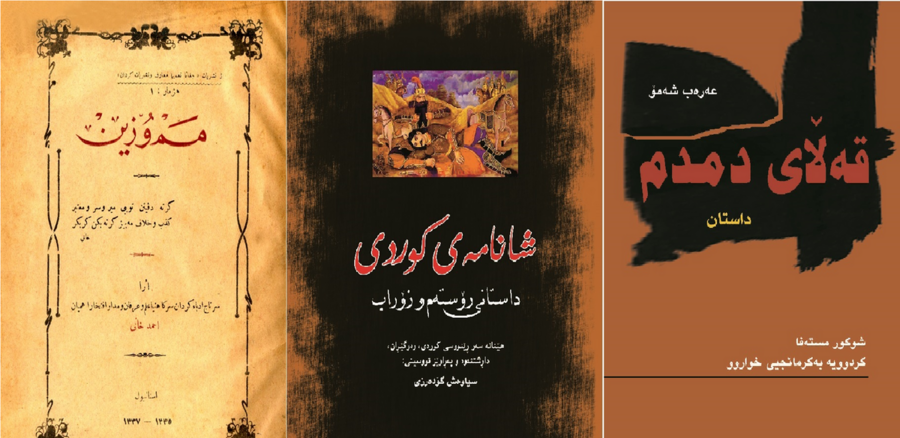Narrative literature has an ancient history in the Middle East. If we want to discuss this deeply, we need to start with old myths such as Holopo Tree, Innana and Ebih myth, Gilgamesh myth, and many other texts that had had deep impacts on this region's literature and even other regions too. Obviously, the original source of these myths is located in Mesopotamia where Kurdistan is a part of it like any other areas in the world, and even in those texts, many cultural and social features particularly the way women appeared in the society are similar to Kurdish societies. Clearly, discussing such topics creates an opportunity for further research and analysis in this field.
On the other hand, texts such as A Thousand and One Night in this geographical area has had more impact on the narration methods of the world's nations, especially this region's societies. In most of the Kurdish folklore stories, these common features can be found.
All the popular literary narratives of the world have been under the A thousand- and one-night narrative impact. Apart from being a rich treasure of thought, social relations, political and cultural thought, and the rest of human thinking fields, the narrative methods of this text are a source for enriching the narratives in those languages that have adopted and retailed this story orally. There are tens of Kurdish folklore stories that are similar to the stories of a thousand- and one-night stories which indicates that not only Kurds have been interested in narrations and they had been familiar with the surrounding area's rich narratives and literature from ancient times and had adopted those texts into their own literature but they also have used common tongue for narrating those stories which led to a rich oral language among them.
The influence of this narrative text is to such extent that great writers such as Gabriel Garcia Marquez, Jorge Louis Borges, and many other writers have pointed out that they have enjoyed a thousand- and one-night stories and their works have been influenced by them, too.
As it was mentioned, the Kurds were close to this rich narrative source and they had known it well. Like any other knowledgeable nation, they have adopted it as a part of their own literary treasure.
We see the art of storytelling in all Kurdish folk Baytes and tales. This common treasure has influenced European folklore and we can see it in the works of Brian Grimm or the Russian and Scotland myths and other countries' literature, too. For example, if we see the common points and similarities between folk stories around the world, it is a sign of shared sources of narratives.
For instance, the well-narrated story of "Dedguna Chare" in Kurdish and "Mah Pishouni" in Persian have both one source, and this similarity can also be found in other texts.
With this background, apart from texts such as Mam and Zin, Kurdish Shahnama, Amir Arsalan, Yusuf and Zuleikha, Layli and Majnoun and other narrations which all belong to the classic world, in this modern world Kurdish narrations also have developed not as much as the western literature but as well as the regional nations' literature like the Persians and Arabs. Now Kurdish literature can be compared to all these nations' literature that will be discussed later.
The existence of the mentioned texts indicates that Kurds have had centuries of experience in the narration field. For example, the long story of Mam and Zin is a well narrated story with most of the storytelling techniques and magical setting that has been told among the Kurds for centuries orally from one generation to another. This folklore story is very long like a novel. It is written in more than one hundred and fifty pages and possesses all the narration features and the modern elements of storytelling can be found in this Kurdish literary work although it has been told for centuries orally. It is said that Mam and Zin by Ahmad Khani which was written four hundred centuries ago was under the influence of this folklore story.
This is the work that Jose Lesko Toma translated and called a masterpiece.
Although Mam and Zin by Khani is known to be poetry, however, it is in fact a masterpiece that must be analyzed in the context of a literary narration. It possesses all the features of a novel. From the very first stages of preparing the plot to the character designs and story techniques such as suspension or flashbacks and …. It means that Khani paid a great deal of attention to poetic details as well as the narration of the events that were considered to be very important among the Kurdish people.
Not only he was very careful in the poetic and musical aesthetic details of this work but he also was cautious in character design of Mam as the prominent hero who was a lover and Bakr Shofar as an antagonist who had a betraying character.
The rest of Kurdish folklore poems and texts possess this feature, too. For example, the works of Khana Qubadi possess these characteristics. However, after that time we reach a time that is identified with narrations.
The first Kurdish narrations with their own identity began with The Conscience Issue by Ahmad Mukhtar Jaff and In My Dream by Jamil Saeb and it reached writers' works including Arab Shamo, Ibrahim Ahmad, Hossein Aref, Abdullah Seraj, Rahim Qazi, and Fattah Amiri.
Among these writers whose names were mentioned, Ahmad Mukhtar Jaff and Jamil Saeb's experiences in literary narration can be regarded as early attempts in this field. In fact, before these writers not only novels but also written scripts were rare among the Kurds. However, after newspapers and modern published papers became popular, the Kurdish writers got familiar with Western methods and forms of writing.
To be continued…









